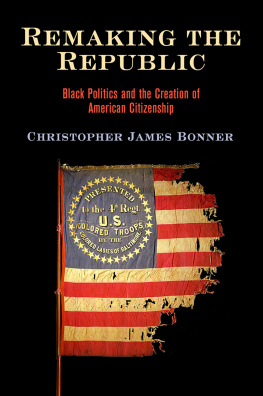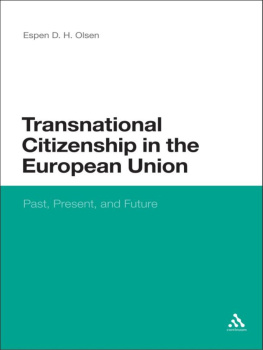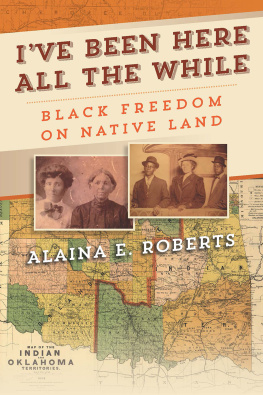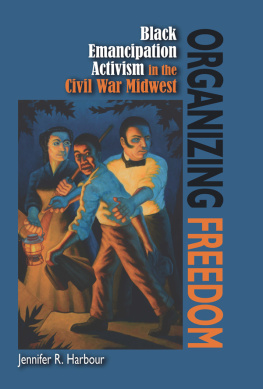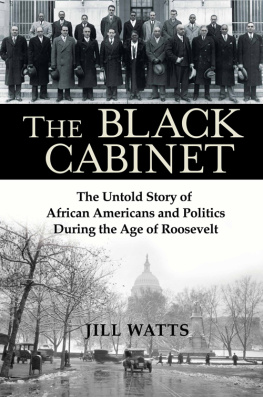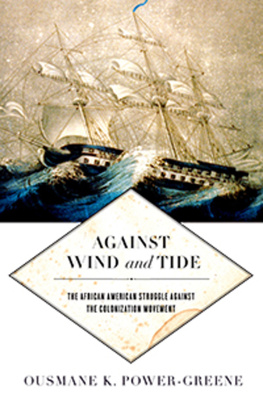The Politics of Black Citizenship
RACE IN THE ATLANTIC WORLD, 17001900
Published in Cooperation with the Library Company of
Philadelphias Program in African American History
SERIES EDITORS
Richard S. Newman, Rochester Institute of Technology
Patrick Rael, Bowdoin College
Manisha Sinha, University of Massachusetts, Amherst
ADVISORY BOARD
Edward Baptist, Cornell University
Christopher Brown, Columbia University
Vincent Carretta, University of Maryland
Laurent Dubois, Duke University
Erica Armstrong Dunbar, University of Delaware and the Library Company of Philadelphia
Douglas Egerton, LeMoyne College
Leslie Harris, Emory University
Joanne Pope Melish, University of Kentucky
Sue Peabody, Washington State University, Vancouver
Erik Seeman, State University of New York, Buffalo
John Stauffer, Harvard University
The Politics of Black Citizenship
FREE AFRICAN AMERICANS IN THE MID-ATLANTIC BORDERLAND , 1817 1863
Andrew K. Diemer
2016 by the University of Georgia Press
Athens, Georgia 30602
www.ugapress.org
All rights reserved
Set in 10.8/13 Garamond Premier Pro by Kaelin Chappell Broaddus
Printed and bound by Thomson-Shore, Inc.
The paper in this book meets the guidelines for
permanence and durability of the Committee on
Production Guidelines for Book Longevity of the
Council on Library Resources.
Most University of Georgia Press titles are
available from popular e-book vendors.
Printed in the United States of America
20 19 18 17 16 C 5 4 3 2 1
Library of Congress Cataloging-in-Publication Data
Names: Diemer, Andrew K., author.
Title: The Politics of Black Citizenship : Free African Americans in the Mid-Atlantic Borderland, 1817-1863 / Andrew K. Diemer.
Description: Athens, Georgia : The University of Georgia Press, 2016. |
Series: Race in the Atlantic world, 1700-1900 | Includes bibliographical references and index.
Identifiers: LCCN 2015036979 | ISBN 9780820349374 (hardcover : alk. paper) | ISBN 9780820349367 (e-book)
Subjects: LCSH : Free African AmericansCivil rightsAtlantic Coast (Middle Atlantic States)History19th centuryCase studies. | Free African AmericansMarylandBaltimoreHistory19th century. | Free African AmericansPennsylvaniaPhiladelphiaHistory19th century. | African AmericansSegregationMarylandBaltimoreHistory19th century. | African AmericansSegregationPennsylvaniaPhiladelphiaHistory 19th century. | Baltimore (Md.)Race relationsHistory19th century. | PhiladelphiaRace relationsHistory19th century.
Classification: LCC E 185.18 D 54 2016 | DDC 323.1198/07307409034dc23
LC record available at http://lccn.loc.gov/2015036979
FOR Gretchen
Africans have made fortunes for thousands, who are yet unwilling to part with their services; but the free must be sent away, and those who remain must be slaves? I have no doubt that there are many good men who do not see as I do; and who are for sending us to Liberia, but they have not duly considered the subjectthey are not men of colour. This land which we have watered with our tears and our blood, is now our mother country and we are well satisfied to stay where wisdom abounds, and the gospel is free.
RICHARD ALLEN , Freedoms Journal, November 2, 1827
CONTENTS

ACKNOWLEDGMENTS

I have been living with this book for what seems like a long time. It is a relief to finally get a chance to thank the people and institutions who have helped me along the way.
The research and writing of this book were made possible by fellowships from a number of institutions. Temple University provided a generous University Fellowship that funded my early research. The Albert M. Greenfield Foundation funded a semester of research at the Library Company of Philadelphia and the Pennsylvania Historical Society. The Center for Humanities at Temple also provided funds for a semester of research and writing, and the Maryland Historical Society provided a Lord Baltimore Fellowship. Thanks to the research staff at the Charles M. Blockson Collection, the Free Library of Philadelphia, the Friends Historical Library at Swarthmore College, the Historical Society of Pennsylvania, the Library of Congress, the Library Company of Philadelphia, and the Maryland Historical Society.
I have received extensive support from Towson University. Terry Cooney, dean of the College of Liberal Arts (and a historian himself ) has been unfailingly supportive, and Ronn Pineo, chair of the Department of History, has been generous and kind. My colleagues in the department have taught me more than they know about balancing the many responsibilities of academic life. My students have kept me learning along with them, even if they have not realized it. All have been patient with me as I traverse the mid-Atlantic borderland between Philadelphia and Baltimore several times a week (though generally at a faster rate than the individuals discussed in this book).
I began this project with a short research paper in a graduate seminar taught by Professor Wilbert Jenkins. I thank him for starting me down this road and for awakening in me a love for African American history. Many other people have also offered advice on various parts of this manuscript, and I am grateful to all of those who offered feedback. I have taken many suggestions, and I will surely regret not taking more. As is customary, none of them bear any blame for the flaws that remain. Thanks to Beth Bailey, Corey Brooks, Marc Egnal, Kelly Gray, Craig Hammond, Scott Hancock, Matt Johnson, Christian Koot, Peter Logan, Kate Masur, Joanne Melish, Abigail Perkiss, Larry Peskin, Paul Polgar, Patrick Rael, Kelly Shannon, Bryant Simon, Beverly Tomek, Jennifer van Horn, and Donn Worgs. Special thanks to Nic Wood, who read a late draft of this manuscript and offered some crucial guidance. The anonymous readers for the University of Georgia Press provided me with startlingly extensive feedback on various versions of this manuscript. I cannot thank them enough. Also, thank you to Walter Biggins at the University of Georgia Press for his patience and thoughtfulness, and to Ellen Goldlust for her heroic work copyediting this book.
Rich Newman has been a friend and advocate. He was kind enough to read a seminar paper from a graduate student he did not know, and he has been unfailingly supportive of me and this project ever since. Drew Isenberg helped to get me thinking about borderlands, though it took me a long time to really understand just how central the concept would be to this project. I hope he approves. David Waldstreicher has helped me at every stage of this process. He has been willing to offer hard criticism when necessary and been generous with praise. Above all, perhaps, he has been an example of someone who cares passionately and intensely about history.
I cannot imagine this book without the guidance and support of Elizabeth Varon. She has been a model mentor, allowing me to find my own way but always seeming to recognize what was best in my work, often before I did. She is an amazing scholar and teacher, but above all she is a good and a kind person. I am glad to know her.


